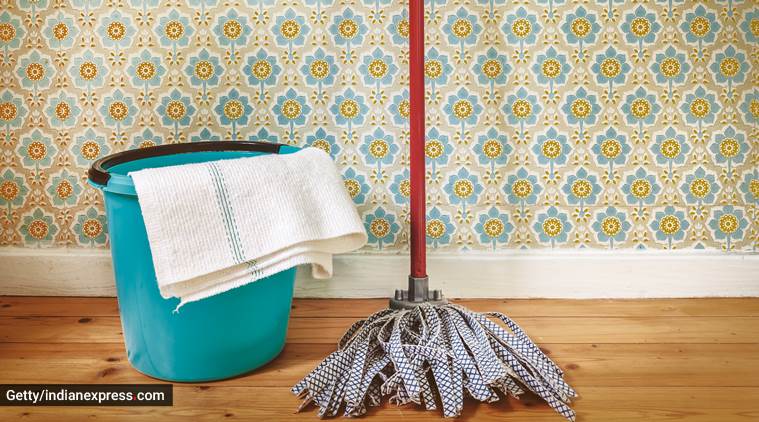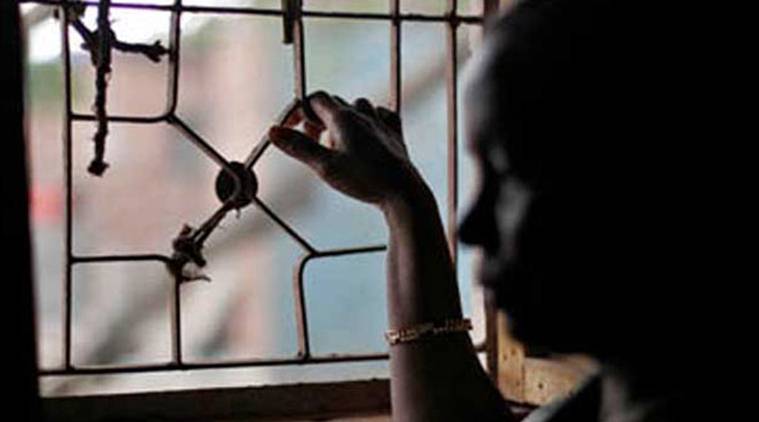 Many domestic helps are being turned away by the RWA. This is causing them great distress, because their livelihood is getting affected. (Source: Getty/Thinkstock)
Many domestic helps are being turned away by the RWA. This is causing them great distress, because their livelihood is getting affected. (Source: Getty/Thinkstock)
Some days into lockdown 1.0, a video went viral on social media. It captured a woman in a frenzied argument with — what appears to be — the security guard of a gated community. It seemed the woman had had it with household chores and was on her way in her car to fetch her domestic help. “Yeh mera kaam nahi hai jhaadu-pocha (it is not my job to mop and sweep),” she says defiantly in the video. The argument continues for some time before she gets behind the wheel and begins to honk for the guard to give way. The video ends.
Needless to say, the unknown woman received scathing criticism from netizens. “Privilege”, someone wrote. Others chose unparliamentary language to oppose her. And while yes, her rants did appear to spring from a point of entitlement, one cannot absolutely dismiss the sheer desperation with which the woman bickered.
So what may have gotten her riled up? The fact that she was having to clean her own house now while juggling other chores? Or the fact that she thought cleaning is beneath her? Or maybe a little bit of both? Or, perhaps, she was led to believe that her domestic help is immune to the virus?
We have already entered the fourth phase of lockdown. While many places remain shut, some have opened up. Zones and areas have been divided as green, orange, red and containment, respectively, with the governments allowing some relaxation in some of these parts. For instance, in big cities such as Delhi, Mumbai, Kolkata, Ahmedabad, Hyderabad and the like — which are all in red zones — domestic help are allowed.
The national guidelines issued by the Ministry of Home Affairs (MHA) specifically say there would be free movement of people in all zones, barring containment zones between 7 am and 7 pm. But when it comes to domestic helps, the opinion remains largely divided.
Malati (name changed), a domestic help who worked in several houses in a high-rise in Greater Noida West, says that barring two families, nobody else is willing to hire her back. “They have refused to even pay me for the days that I could not work, because of the lockdown. How is it my fault? I wanted to continue working. I still want to work, but gate par allow nahi karte hain (they do not let us enter through the society gate),” she says, adding: “They tell me that since I am not working, they cannot continue paying me either.”
Like Malati, many domestic helps are being turned away by the RWA. This is causing them great distress, because their livelihood is getting affected. Most domestic helps work on meager income anyway, and are sometimes the sole breadwinners of their family. Malati, for instance, has to look after her two sons, one of whom is just a few months old, because her husband does not have a regular job. And while two of her employers are willing to hire her back and pay her salary, the RWA is refusing to budge.
WhatsApp groups in the aforesaid society, for instance, are abuzz with heated exchanges of whether or not to allow the entry of domestic helps. “Let the help work in one or two houses only. We cannot risk the well-being of the members of the society; what if the maids are carrying the infection?” wrote a member.
What role does the RWA play?
While they are not above the government, across the country, many RWAs are prohibiting the entry of domestic helps.
When the Prime Minister had announced the ‘Janata Curfew’ in March, many families were forced to comply and give their helps a day’s leave. But even as the country witnessed a surge in the number of cases, people showed great reluctance in completely letting go of the services of their domestic help. Just like the women in the video, they suggested that maids be given hand sanitizers and masks, but allowed to work in houses.
And now, when the government is insisting that it has no issues with the services of domestic workers, or any other service provider, RWAs are insisting and acting otherwise.
This poses one major question: are we, as a nation, treating our domestic helps — on whom we rely so deeply — unduly?
In Bengaluru, 13-year-old Auric Paul had been, until recently, helping his parents with household chores, when his summer vacations were on — all the while gaining a newfound respect for housemaids. “We get exhausted after mopping the floor one afternoon — and it also takes us longer. But they work in multiple houses every day, day after day,” he says. Unfortunately for Auric, while the domestic help was back at his place when the lockdown restrictions were relaxed, she had to discontinue her services in many other houses because they refused to hire her back.
But no association, least of all dependency, can be snapped overnight. So, how have people been managing now?
For Sharmila Bose, a resident of Delhi’s Pashchim Vihar, the transition was a tad difficult for the initial two weeks of lockdown, before she found a routine. Previously, her help would sweep and mop her 4 BHK, do the dusting, water the plants, chop vegetables and wash the utensils. Now, having to do it all by herself, she says she realises how domestic help makes life easy. “Of course, they do. My husband and I sweep and mop the house every alternate day, because it is difficult to do it every day. And as opposed to storing the utensils for later, thinking she will take care of it, I now wash them immediately,” she says. Bose intends to continue to pay her help, and hopes she will get back to work, soon.
 Most domestic helps work on meager income anyway, and are sometimes the sole breadwinners of their family. (Representational image)
Most domestic helps work on meager income anyway, and are sometimes the sole breadwinners of their family. (Representational image)
Jaipur-based Parul Sharma (30) was clear about her plans, even though household chores overwhelmed her at the beginning. “I have poor immunity, so I decided to extend her leave till May-end — especially since she lives in, what has been identified as, a hotspot in the city,” she says. Parul and her husband now divide the chores — cooking and cleaning — and do not fret if the house is not in order. “I was just thinking a few days ago how thankful I will be when my help returns. The house will look sparkly again. But, if there is one good thing that has come out of this experience, it is that my culinary skills have significantly improved; this has made my mother happy,” says the airport professional.
There are many, though, who insisted their help stop coming much before the lockdown was announced — even at the cost of facing inconvenience themselves. Among them is 33-year-old Shyni Chatterjee, a company secretary, who lives in a highrise in Greater Noida West. “It has been a strange experience. While almost all of us are dependent on help, this lockdown has made us realise that we are capable enough to manage the house by ourselves at any given time, under any circumstance. I don’t try to achieve perfection; rather I do whatever needs to be done on a priority basis. It helps that my husband is home, too. We have divided household responsibilities and that includes taking care of our daughter,” she says.
Chatterjee has paid her help in full, but not everyone is as benevolent.
A South Delhi-based homemaker, on the condition of anonymity, says that while she has paid her domestic help her salary for the months of March and April, she does not intend to continue paying her. “And why should I when I am not availing her services anymore? I am not ruthless, but I really see no reason to continue sending her money digitally. I paid her whatever was her due. Now, since I am doing everything myself, I see this as ideal,” she shares.